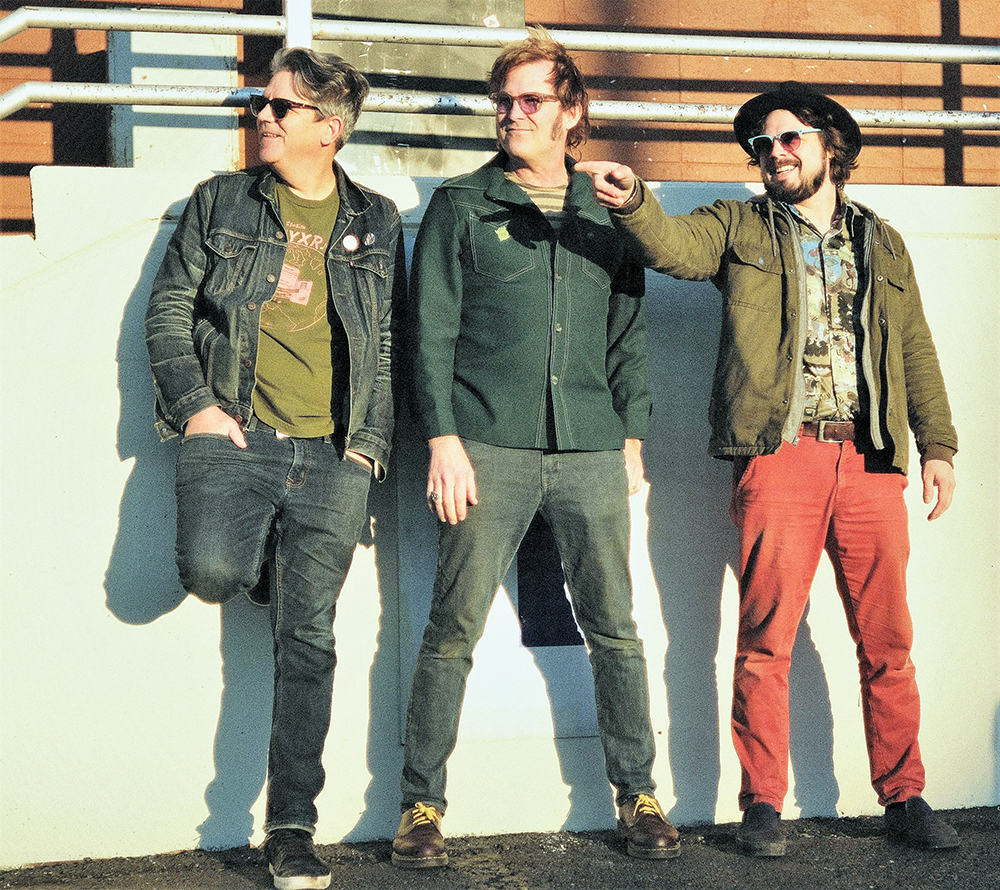If you’re a music fan, sometimes you sense such a connection with a band that you feel compelled to join the group by any means necessary. Even non-musicians know the feeling: “I have to be in this band!” Jared McStay, who first burst upon the scene with the Simpletones (aka the Simple Ones) in the early ’90s, then went on to become a co-owner of Shangri-La Records, felt this way about the Turnstyles, Seth Moody and Graham Winchester’s guitar/drums duo, back in pre-Covid days.
As Moody describes it, “Jared wanted to play bass for the Turnstyles so bad! We were like, ‘No, you don’t get it! It’s a two-piece. There’s no bass!’ But he was just relentless. He’d come to see us and in between sets he’d say, ‘Dude! That song needs a bass on it!’ So I told Graham, ‘Let’s just start a different band and do the songs that don’t work without bass.’ There are certain songs where you just can’t cover everything with guitar. And I’ve tried, doing pretzel chords while I solo and all that. And So Gung Ho started that way: ‘We’ll just do all the songs we can’t pull off as a two-piece.’”
But a funny thing happened on their way to being a trio: McStay had a lot more to contribute than just a big bottom end. “Then we realized that Jared’s got this treasure trove of awesome originals,” says Moody. “I’d only heard one or two of them at that point, two or three years ago, but he had a whole portfolio of great, kind of Kinks-y pop songs. Cool lyrics and neat chord changes and hooks that stuck in your head. So we were like, ‘All right! Let’s utilize his catalog and pepper in a couple originals from me and Graham.’”
The result was a self-titled LP, bursting with energy and fun, which has been in heavy rotation on this writer’s turntable since its release on Blast Habit Records last year. (The launch of the label, run by Jared McStay, his wife Lori, and Winchester, was detailed in our blog last June.) It turned out that McStay, Moody, and Winchester were on the same stylisitic page. And not a page from, say, an Anne Sexton anthology, more of a page from an Archie comic.
“It’s fun,” says Moody. “It’s kind of like tongue-in-cheek rock. Like meathead rock. We’re making fun of the guys that take it too seriously. The unspoken rule is, ‘nothing too introspective.’ Make it fun or aggro. If a song has a little more testosterone, throw it in the So Gung Ho bag. We’ll never do a Beck thing, where it’s fun, then depressing, then fun. We’ll skip the depressing ones!”
Nothing expresses that sense of levity more than McStay’s “Free Man Band,” which makes use of cod-Cockney to obliquely chide groups with an overwrought sense of mission. “As usual you’re half past late/Hangin’ around on some date/Wif your uvver group … This was ’sposed ta be/A free man band/And you ain’t gonna be/No free band man!”
Though much of So Gung Ho’s origin myth hinges on the sanctity of two-piece versus three-piece lineups, the song was conceived much earlier. “I would bet $14 that that song was at least a year or two old before So Gung Ho came into existence,” says Moody. “It’s funny, I’ve been put in that situation a few times. And it’s fun to picture these British blokes arguing with each other. It’s harder to understand in Memphis. We all recycle our band members like mad in this town. That song wouldn’t make much sense with Midtown musicians.”
The sense of play, undergirded with choppy riffs, propulsive bass and drums, and chiming background vocals, is downright contagious, especially when combined with the lyrics. The band’s theme song (and album closer) captures that attitude in a nutshell: “We were so gung ho/About doin’ that thing/That we wanted to do … and I can’t recall what we wanted to do/But it was probably cool!” Nowadays, with the hopes of the last two years so clouded by deferred dreams and postponed plans, it’s easy to forget what we were on about, way back when. But, as this band reminds us, what’s important is that we remember that feeling — the feeling of being so gung ho!
